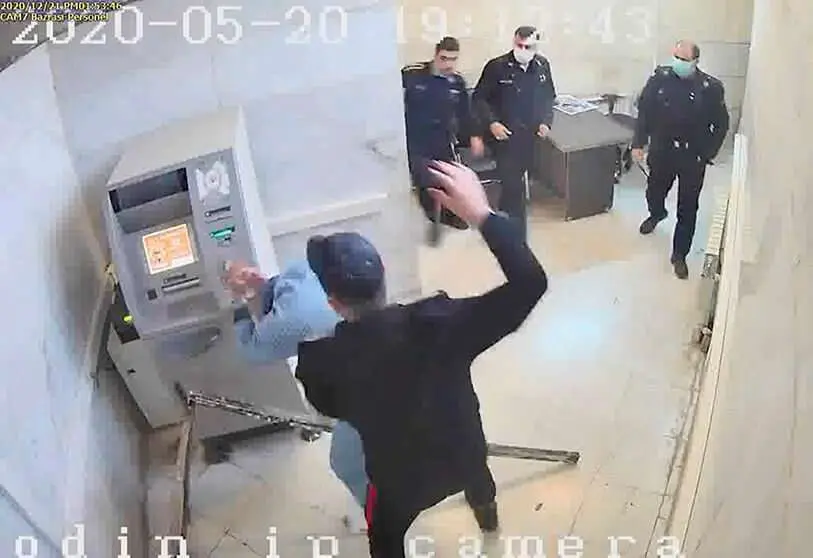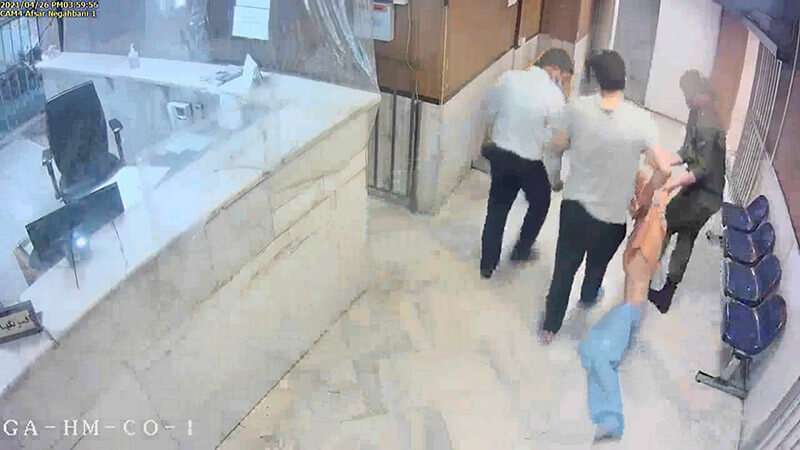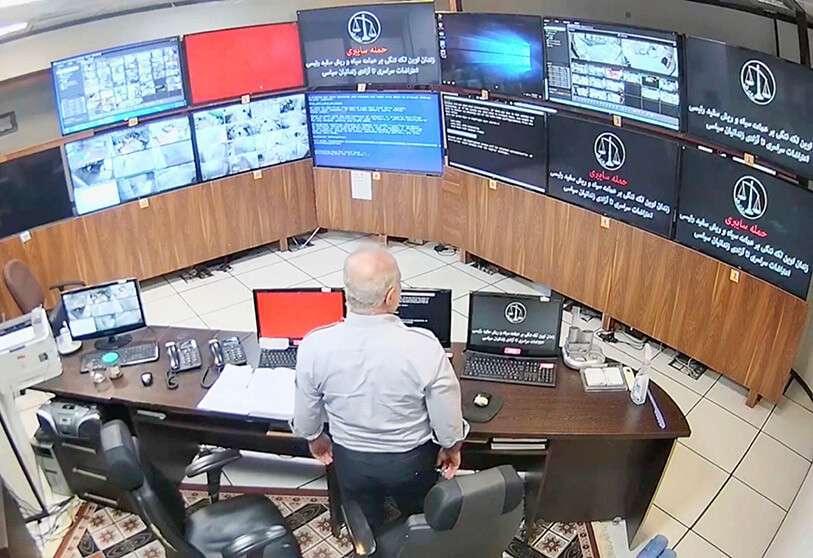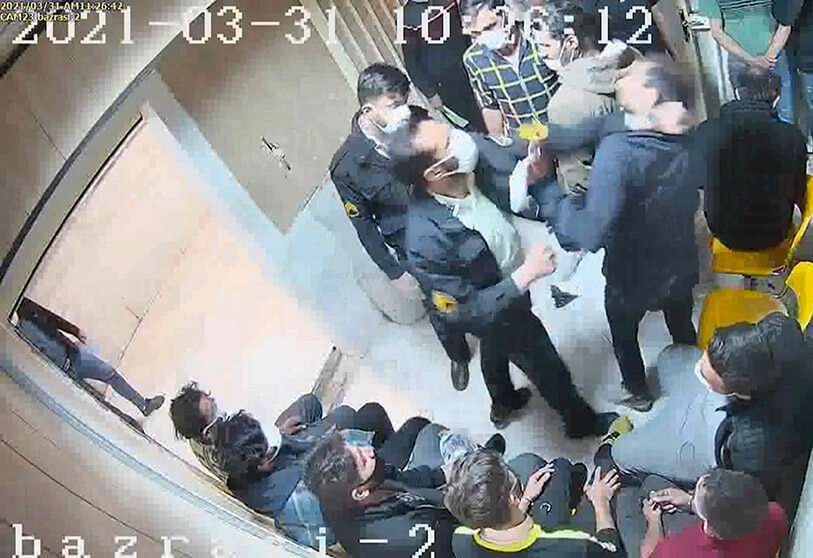A look at what is happening in Iranian prisons

A few days ago, hackers in Iran managed to hack into the security cameras of the notorious Evin prison in Tehran. By publishing some of the videos copied from the security cameras, they were able to show the public a small part of what goes on in this prison.
Different scenes in these videos show the truth of what really happens in Iranian prisons, such as the mistreatment and beatings of prisoners by prison security officers, which is the complete opposite of what is shown in the regime's propaganda films. For example, in one scene a person appears unconscious, is dragged along the floor as if he were a corpse and is carried up the stairs of the building in the same way.
Interestingly, in the same scene, a prison cleric who comes down the stairs, oblivious to the man's tragic state, and without even asking a question passes over the man's unconscious body and continues on his way. It is clear that the cleric is used to such scenes, and finds it quite normal.

The images released, although not taken in the torture chambers or in the wards of political prisoners (as it is likely that cameras were not installed in those chambers so that the torturers could work in safety), are so disturbing that they provoked a widespread reaction inside Iran. It became so intense among the Iranian people that even some members of parliament, who know well what goes on in the prisons, offered worrying comments to calm the situation.
Interestingly, a person named Mohammad Mehdi Haj Mohammadi, who is in charge of the country's prisons, offered an apology and took responsibility for the behaviour of the prison guards. But he did not apologise to the Iranian people, but to Ali Khamenei, the supreme leader of the regime, as well as to the prison guards, whose efforts, he said, will not be ignored under the influence of these mistakes.
Of course, the reason for his apology is clear. It was not for the mistreatment of prisoners by prison guards, but for the revelation of a small part of what goes on in Iranian prisons and the exposure of some of the guards to the public.
And now, instead of trying to hold the head of the prison and the prison guards accountable, they are looking for the hackers who exposed these crimes.
It is like what happened during the 2009 uprising, when news of the deaths of many protesters detained in Tehran's infamous Kahrizak prison under torture leaked out. A doctor who refused to announce that the cause of the deaths was a heart attack was killed by security forces.
Of course, for many years, released prisoners and regime opposition groups, in particular the MEK, who have been fighting against the mullahs' regime since the beginning of the revolution, have denounced the torture and ill-treatment of prisoners to the international community.
Many of the MEK's sympathisers and members had to suffer similar torture and were killed in prison. There is a great deal of evidence to this effect. But since there have been no real time images, clips, audio tapes, etc. of all the brutalities that were taking place in Iran's prisons and are still taking place, the Iranian regime systematically denies any kind of mistreatment of prisoners.

This is the first time the regime has been forced to accept such brutal treatment of prisoners.
Even when Zahra Kazemi, an Iranian Canadian photographer and journalist was arrested and tortured to death by the regime's security forces in 2003, the Iranian regime refused to accept responsibility for her murder and did not allow her body to be sent to Canada, as the evidence of torture and murder was clearly on her body. It should be noted that this led to the severing of Canada's diplomatic relations with Iran, which is still ongoing.
It should be noted that Mr. Javaid Rehman, the UN Special Rapporteur on Human Rights in Iran, in his latest report, mentioned a serious escalation of human rights violations in Iran. This report is scheduled to be presented at the next meeting of the UN Human Rights Council.
Iran has not allowed any special rapporteurs on human rights to enter the country for the past thirty years.
Recently, in her annual report to the 47th session of the UN Human Rights Council, which took place from 21 June to 13 July in Geneva, UN Human Rights Commissioner Michelle Bachelet described the human rights situation in Iran as worrying.
Amnesty International also issued a statement on 25 August saying that "it is shocking to see what goes on behind the walls of Evin prison and that the abuses depicted in the films are just the tip of the iceberg of torture in Iranian prisons".
Torture such as confinement in a one cubic metre cage or in a coffin for several months or flogging to death and many other tortures are not seen at all in these films.
It should be noted that these events coincide with the appointment of Ebrahim Raisi as the new Iranian president. Raisi, who was directly implicated in the massacre of 30,000 political prisoners in 1988, was sworn in as the new president in June in a sham election organised by Khamenei.
He is currently blacklisted and sanctioned by the US and the EU for his role as the judge who ordered these massacres.
Incidentally, at the same time, one of Raisi's accomplices in this massacre, Hamid Nouri, assumed that no one would remember him after 33 years, travelled to Europe in November 2019, but was identified by some of the survivors of those years and was arrested in Sweden because of his denunciation, and is currently on trial in Stockholm for "Crime against humanity", "Genocide" and "Torture" of political prisoners in 1988.

In this trial, a significant number of prisoners who managed to escape from Iranian prisons, or rather escaped from the Iranian regime, testified in court against this criminal and torturer. His trial is expected to continue until the end of the year and is expected to point to Ebrahim Raisi's role in this massacre.
The release of the recent images from Evin prison, which have been widely circulated and shared both in Iran and around the world, will undoubtedly tie the hands of Western governments that claim to respect and prioritise human rights.
These governments will now have to choose between human rights values or appeasing the Iranian regime and prioritising economic interests.
The majority of Iranians want to overthrow the current dictatorship and establish a free democratic government based on the separation of religion and state. They expressed this desire peacefully with the widespread boycott of Khamenei's recent sham elections.
Cyrus Yaqubi is a research analyst and commentator on Iranian foreign affairs who researches social issues and the economy of Middle Eastern countries in general and Iran in particular.

